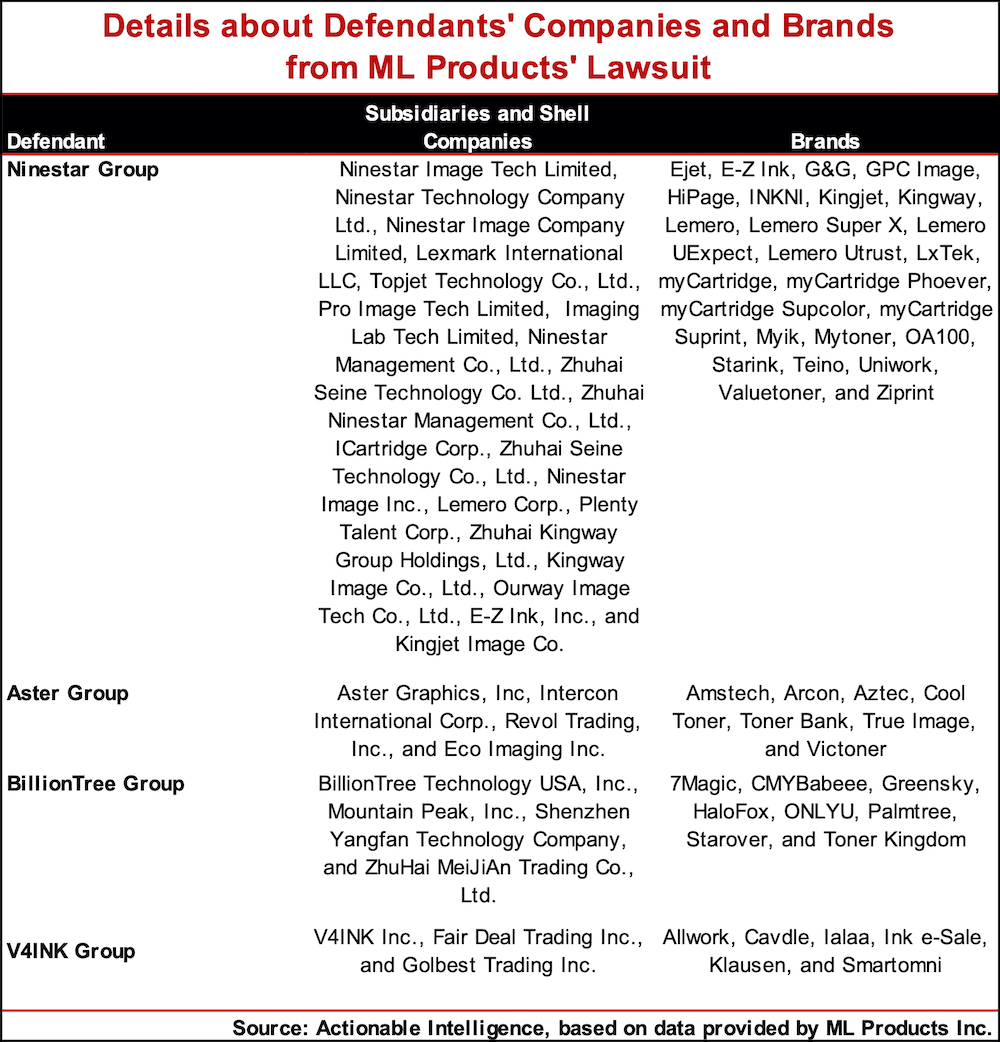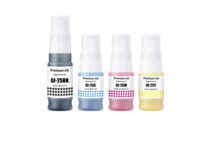Over the years, we have heard multiple independent Amazon sellers complain about the tactics some third-party supplies vendors employ on Amazon to inflate product rankings and drive sales. Now, one such seller, ML Products Inc., has filed an ambitious and incredibly detailed lawsuit claiming unfair competition over the practices various big-name defendants allegedly use to sell products on the Amazon marketplace. The lawsuit names as defendants Ninestar Technology Co., Ltd.; Ninestar Corp.; Aster Graphics, Inc.; BillionTree Technology USA, Inc.; Mountain Peak, Inc.; and V4INK Inc.
ML Products declares:
This is a case about unfair competition. Defendants, who are sellers of third-party printer ink and toner cartridges on the Amazon.com online sales platform, have successfully deployed numerous false, deceptive, unfair, or otherwise unlawful tactics in order to inflate their retail sales at the expense of sales by Plaintiff ML Products Inc., a competing third-party ink and toner seller. Third-party ink and toner cartridges generate an estimated $350 million or more in annual sales on Amazon. Sellers, including ML Products and Defendants, compete for those sales. Defendants, however, have dominated the market through their deceptive and unlawful actions as described herein, and ML Products Inc. has as a result been cheated out of millions of dollars in sales.
General Gist
The plaintiff that filed the 72-page complaint, ML Products Inc., describes itself as a Los Angeles-based online distributor and retailer of various kinds of toner and ink. The firm sells replacement ink and toner cartridges on Amazon. The company was incorporated in California in 2005 by a Mark Schwanauer who remains the firm’s CEO. It is located in Thousand Oaks, CA. We were able to find the firm selling on Amazon under the seller name Be Green Ink, Inc.
The defendants are well-known names in the third-party supplies industry. They include Ninestar Corp. (Ninestar China), an enormous third-party supplies manufacturer and printer OEM based in Zhuhai, China, as well as Ninestar Technology Co., Ltd. (Ninestar U.S.), of Chino, CA, which is a U.S. sales arm for Ninestar Corp. Other defendants include Aster Graphics, Inc. of Riverside, CA, which is the U.S. sales arm for the manufacturer of the same named based in Xinyu, China. The lawsuit describes defendant BillionTree Technology USA, Inc. of City of Industry, CA, in the past tense, saying it “is or was a business engaged in the online sale to consumers of replacement toner and ink cartridges on Amazon.” The complaint claims its various brands on Amazon are now operated by defendant Mountain Peak, Inc., of City of Industry, CA, which is the successor organization to BillionTree, but the lawsuit describes both organization as part of the “BillionTree Group.” The last named defendant, V4INK Inc., is an Amazon third-party ink and toner seller based in Diamond Bar, CA. The lawsuit also says there are certain “Doe Defendants” whose identities are unknown now but who may be named as defendants at a later date.
The lawsuit accuses the defendants of tactics that “are designed to manipulate Amazon’s algorithm into artificially elevating their listings to higher priority positions in the organic search results for keywords relating to ink and toner.” The reason why the defendants are doing this, according to the plaintiff, is that “Sales on Amazon are driven to an overwhelming extent by a product’s placement among the relevant products in Amazon’s organic search results based on keyword searching.” Amazon’s algorithm prioritizes certain items in an organic search result based on keywords, and “Most shoppers never look beyond Amazon’s first page of search results.”
ML Products alleges that defendants have successfully employed a variety of tactics to elevate their listings to better positions on Amazon, including the following:
- commissioning fake product reviews;
- compensating customers for product reviews or to change or remove negative product reviews;
- manipulating sales rank by accepting fake orders that Defendants themselves pay for;
- use of “ghost” accounts to manufacture the false impression of interest in or sales of products, to inflate product ratings, and/or to manipulate the “helpful” voting for (likely false) positive reviews of Defendants’ products; and
- reusing older product listings (and their accompanying review history) with new product offerings in order falsely to capitalize on past sales and review history for new products.
The plaintiff says these tactics are deceptive but adds “that is not the full extent of Defendants’ deception.” Defendants deploy another set of deceptive tactics, according to ML Products. The defendants “exacerbate the impact of these deceptions by deploying them in combination with their use of multiple seller accounts that appear to offer competing products to the consumer.”
ML Products explains:
Each of the Defendants owns, operates, and/or controls multiple selling “brands,” typically through an opaque web of sham business entities, so that it can occupy not just one of the top spots in Amazon’s organic search results, but multiple spots. If a single spot high in the organic search results is valuable for generating sales (and it is), then holding multiple high spots is even more valuable. Through this practice, Defendants create the false impression that multiple sellers are competing to sell third-party toner or ink replacements compatible with the consumer’s needs, when in fact, these straw-sellers exist only to crowd other potential sellers out of the top search result spots. With this tactic, each Defendant falsely portrays itself as though it is a number of competing sellers for the same product (all of which employ the same ranking manipulation tactics), further enhancing its sales at the expense of honest sellers.
The plaintiff asserts that all the tactics it complains of violate Amazon’s marketplace rules and seller contracts. Moreover, these tactics violate the law, says ML Products. ML Products’ claims against the defendants include false advertising and/or unfair competition in violation of the Lanham Act, violation of California’s Unfair Competition Law, and violation of California’s False Advertising Law.
ML Products seeks as remedy monetary damages and “disgorgement of Defendants’ ill-gotten profits,” enhanced or treble damages, and recovery of attorneys’ fees and costs. The lawsuit also seeks injunctive relief, specifically “an Order enjoining Defendants from engaging in the false and unlawful conduct described in this lawsuit.”
Lots of Names, Brands, and Details
A key part of ML Products’ complaint is the allegation that the defendants control a variety of brands, some of them affiliated with shell corporations, that do business on Amazon and function essentially as “alter egos” of the defendants. This has enabled the defendants to be enormously successful on Amazon. The plaintiff says third-party ink and toner sales on Amazon amount to about $350 million annually, and the plaintiff provides the following estimates of the defendants’ annual sales of third-party ink and toner on Amazon:
- $160 million for the Ninestar group or nearly 50 percent of the market;
- $50 million for the Aster group or more than 10 percent of the market;
- $25 million for the BillionTree group or about 7 percent of the market; and
- $20 million for the V4INK group or about 5 percent of the market.
The plaintiff accuses the defendants of unleashing “an ever changing barrage of deceptive tactics in order to game the Amazon algorithm.” ML Products quips, “Round and round they go, and as soon as Amazon catches up to one black-hat tactic, Defendants switch to another. “
ML Products details across multiple pages of the complaint what is describes as “one of Defendants’ primary deceptive tactics,” namely “selling the same ink or toner disguised under multiple different brand names.” The plaintiff asserts,”By selling the same item under different brand names using different seller accounts, Defendants generate more opportunities for their products to land at the top of the organic search results. They also give themselves an opportunity to occupy more than a single spot in the search rankings, which simultaneously pushes down the listings of their actual competitors.”
The plaintiff’s aim is clearly to bring the proverbial receipts. The complaint provides details about the defendants’ “alter ego” companies and about the brands they sell under on Amazon. ML Products has combed through financial reports, incorporation filings, trademark filings, and lots and lots of Amazon listings. While it is impossible to summarize all the detail from the 72-page complaint here, the table below provides the companies and brands allegedly affiliated with each of the defendants.
But it is not just the use of alter ego companies and multiple brands that is the problem, according to ML Products. The plaintiff says defendants use a number of “cheat code” techniques that manipulate Amazon algorithms into awarding them priority in search results. The plaintiff describes the same deceptive tactics listed above (fake product reviews, compensating customers for favorable reviews, accepting fake orders to manipulate sales rank. manipulating the “helpful” voting for reviews, and reusing old product listings).
The plaintiff asserts:
These tactics build upon and enhance each other … Using these cheat codes in conjunction with their crowding strategy, Defendants artificially boost multiple different listings to the limited number of top spots in the organic search results, effectively shutting out of the market any seller not using these tactics. Unless Amazon punishes the cheating seller, the seller continues to benefit through high sales and honest sellers continue to be pushed unfairly out of the market. Ironically, the more this leads to actual sales, the higher the product is then rated and ranked in organic search results by Amazon’s algorithm: a feedback loop fueled by deception.
The complaint cites multiple examples of the defendants’ alleged “cheat code” behavior.
An Important Case to Watch
ML Products’ lawsuit becomes, we think, one of the most important cases in the industry to watch. As we noted at the outset of this article, we have heard many Amazon sellers complain over the years that bad actors gaming the system at Amazon make it impossible for them to compete. Someone clearly spent many hours—likely hundreds or more—researching all the data compiled in this complaint. We would be curious to learn if this is all the work of the plaintiff and plaintiff’s counsel or if other interested parties contributed to the effort. Because from what we have heard, there are certainly other Amazon sellers that have drawn similar connections between brands on Amazon over the years and have gripes similar to those of ML Products.
It is, of course, important to remember that the allegations in this complaint are just that—allegations and ones to which the defendants will have the opportunity to respond. Their perspective is likely different, and we look forward to following how they answer ML Products’ complaint.
In addition to following how defendants will respond, Actionable Intelligence is interested to see how this lawsuit fares in the courts. It is the first case of its kind we have seen and may have significant ramifications. Or not. It is, of course, possible that this lawsuit will end as so many of them do: in some sort of private settlement agreement. If so, this lawsuit could prove a flash in the pan—initially exciting only to flame out quickly.
But prevalence of settlements aside, it is important to bear in mind that every so often a lawsuit comes around that changes things, and it is often difficult to see the lasting effects in the early stages of the litigation. For example, when one small remanufacturer called Impression Products defended itself against Lexmark’s patent-infringement allegations, few could have guessed that the end result would have been changing U.S. patent law and securing remanufacturers’ rights to remanufacture spent cartridges (see “U.S. Supreme Court Sides with Impression Products and against Lexmark on Patent-Exhaustion Questions”). Time will tell if ML Products proves such a changemaker.







